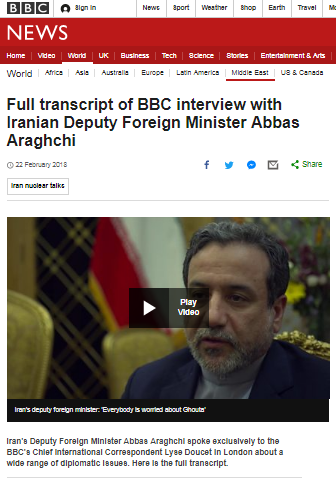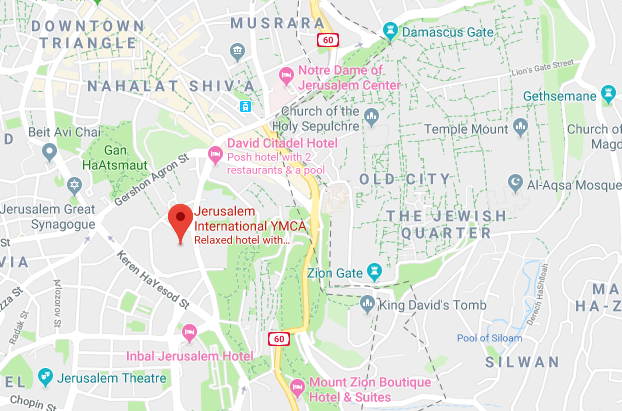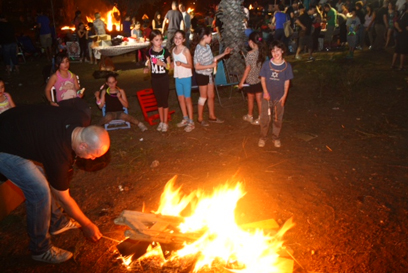As has been documented here (see ‘related articles’ below), one notable feature of the BBC’s coverage of the infiltration of an Iranian drone into Israeli airspace on February 10th was the corporation’s unnecessary qualification of the event.
“The Israeli military says a “combat helicopter successfully intercepted an Iranian UAV [unmanned aerial vehicle] that was launched from Syria and infiltrated Israel”.
It tweeted footage which it says shows the drone flying into Israeli territory before being hit.” [emphasis added] BBC News website
“Israel’s military, the IDF, released this footage from one of their helicopters. They say it shows an Iranian drone flying over Israeli territory.” [emphasis added] BBC News website
“…the Israelis have a very different narrative of the events of the past 24-36 hours and for them the original provocation was the flying of this drone over their territory.” [emphasis added] BBC World Service radio
At the same time, BBC reports also amplified Iranian disinformation.
“Meanwhile Iran and the Tehran-backed Hezbollah movement in Lebanon – which are allied with the Syrian government – dismissed reports that an Iranian drone had entered Israeli airspace as a “lie”.” BBC News website
“Iran denied it had sent a drone into Israel and defended the Syrians’ right to self-defence.” BBC News website
Significantly, the BBC’s coverage of that and related stories also failed to provide audiences with an accurate portrayal of the context of Iranian military activities in Syria and Lebanon.
On February 22nd the BBC News website published an article titled “Fear of war looms over Syria neighbours, Iran says” on its Middle East page. The article is based on a filmed interview by the BBC’s chief international correspondent Lyse Doucet with Iran’s deputy foreign minister Abbas Araghchi and a transcript was also promoted on the website.
In the article BBC audiences were told that:
“The deputy foreign minister refused to confirm that Iran had sent a drone into Israeli airspace from Syria earlier this month. He said the drone belonged to the Syrian army.”
As can be seen in the transcript, Doucet’s challenge to that blatant disinformation was remarkably weak.
“DOUCET: But they’re [the Israelis] angry about the drone which they say you sent into Israeli airspace. What was its purpose?
ARAGHCHI: The drone also belongs to the Syrian army.
DOUCET: But it was Iran that sent it over into Israel.
ARAGHCHI: Well I cannot confirm that. The Syrian army has lots of capabilities. But the fact is that the Israeli army is also sending drones up on a daily, or hourly basis all around Syria and in other neighbouring countries. So they shouldn’t be angry when they are faced with something that they are doing against others on a daily basis.
DOUCET: Was the drone to test Israeli resolve, was that why it was sent in? What was its purpose?
ARAGHCHI : Well I think you should ask the Syrian army men why they, you know, why they did that. But the fact is they were able to shut down a jet, Israeli jet fighter who actually entered into their airspace. So this is, this is a very important development and I think the Israelis should reconsider their, you know, their military policies.”
Lyse Doucet also provided Abbas Araghchi with a platform for amplification of disinformation concerning Iran’s activities in Syria – portrayed in the article thus:
“Mr Araghchi told the BBC’s chief international correspondent Lyse Doucet that Iran was there to fight terrorism, and dismissed warnings about Iran’s intentions as “propaganda”.
“Just imagine if we were not there. Now you would have Daesh [the Islamic State group] in Damascus, and maybe in Beirut and other places,” the minister said. […]
Mr Araghchi said Iran was in Syria to fight “terrorist elements” at the invitation of the Syrian government, and its alliance with Syria and the Lebanese militant group Hezbollah aimed to “combat the hegemonic policies” of Israel.”
As can be seen in the transcript, Doucet made little effort to challenge that Orwellian disinformation either and failed to clarify to BBC audiences that Iran’s proxy Hizballah initiated the 2006 war.
“DOUCET: Prime Minister Netanyahu expressed what others have noticed, that Iran seems to want to establish a land bridge, a corridor, from Iraq to Syria into Lebanon, connecting all of its allies. Is that your strategic ambition?
ARAGHCHI : Well we are in Syria fighting a terrorist elements, and we have there by the invitation of the Syrian government to help them establish peace and, you know, stability and territorial integrity of Syria. We continue to be there as long as we are asked by the Syrian government to help them fighting the terrorist and terrorist elements, and to establish peace and order and stability in that country.
DOUCET: But it’s also – you saw the New York Times did a study of all the Iranian positions of Iran, you know the IRGC (Islamic Revolutionary Guard Corps) advisors, also your allies like Hezbollah, the other militias, giving the impression that Iran is establishing its own bridgehead in –
ARAGHCHI: Just imagine if we were not there. Now you had Daesh [Islamic State group] in Damascus, and maybe in Beirut and other places. So I think we have to actually don’t care about these kind of propaganda which have some other objectives perhaps.
DOUCET: Some say this latest call is to make Syria a new front, between Iran, Hezbollah and Israel – an Axis of Resistance, as they call it.
ARAGHCHI: Well an Axis of Resistance is there for a number of years now.
DOUCET: But you’ve been, is that your ambition to strengthen it for Iran?
ARAGHCHI: This is actually to combat the hegemonic policies of Israeli regime in the region, and to, you know, stand firm against Israeli aggression. We all remember –
DOUCET: So it is an Axis of Resistance?
ARAGHCHI: Well the Axis of Resistance is always there, you know, when Hezbollah and the Syrian government actually combat it, Israeli forces when they attacked Lebanon in the past, we all remember Israeli attacks to the Lebanon territory, we all remember when they occupied Beirut, you know, as an Arabic, Arab captor. And we all remember 2006 when they invaded southern Lebanon. I think Lebanon, Syria and other countries in the region have every right to establish a kind of resistance against these aggressions by Israelis.””
Doucet refrained from asking Araghchi about his country’s repeated violations of UN SC resolution 1701, the support it provides for terror groups in the region including Hizballah, Hamas and the Palestinian Islamic Jihad or the genocidal threats against Israel repeatedly voiced by Iranian regime officials.
“DOUCET: Now Prime Minster Netanyahu made it clear in Munich, and I quote: he says Israel will continue to prevent Iran from establishing a permanent military presence in Syria. Do you take that threat seriously?
ARAGHCHI: I think Israel should find the root causes of its problems somewhere else. They always try to accuse Iran for the problems they are facing in the region and I think this is actually wrong perception they are creating and against Iran, and I don’t think they can achieve anything by this.”
Obviously one must wonder why the BBC thinks that its audiences’ understanding of the background to recent and potential events in the Middle East (as well as other topics such as the demonstrations in Iran and the imprisonment of dual nationals) is enhanced by hearing poorly challenged disinformation and spin that could just as well have been aired on Iranian state TV.




